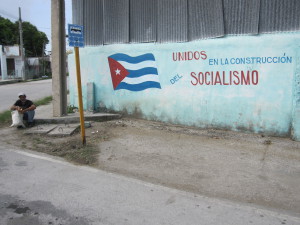Argimiro Caro was an activist for democracy in Cuba till migrated to other lands in 2005. A long time ago, he swore once he was convinced that in one visit to the dentist, the doctor inserted a chip in one piece to keep him located. “You do not see a dark shadow next to the molar? Here it is to place me wherever I go and to record all I say”. I laughed at his occurrence, but he explained to me, that every time he held a group meeting, political police monitored it and they always knew where it took place and what their objectives were. What Argimiro said in every time and place, even asleep, even in dreams, came down to the security agents.

I suggested to remove his molar in order to conclude this martyrdom, but he showed me the gum. This misallocated molar and three teeth was what subsisted there due to lack of calcium as a consequence of his times in prison. Without going much further I proposed that he put in prosthesis, but he was terrified once more. “You are crazy?! Do you want me to have a mouth full of chips?!”
Julio Peña, alias Pipo, a neighbor in Jaimanitas, also emigrated to the United States as a refugee. He visited me in the afternoons on days prior to his departure and told me how he was followed everywhere by agents in civilian clothing. On the bus, by foot, in a taxi, wherever he moved they were there, closed up behind him. They took turns while realized Pipo could identify them, not only by their motorcycles, but also by their shirts, pullovers and tennis. The situation remembered a sort of a spider’s web.
I tried to convince Pipo that it was irrational to believe that such expenditure of resources, men and salaries, were allotted only to know where he was going and with whom he was speaking to. His response just was: “and you do not believe that at this moment we are being filmed and recorded?”. The idea they knew everything I do, say, and think made me a little bit crazy for a moment and it provoked a feeling of aversion for this collective fear: a type of Cuban 1984 incubated in the genes of generations after 1959. I looked on both sides of the street and saw people standing in doorways, killing time on the corner. I suspected all. Surely someone else tried to clear up what Pipo told me and what I answered…
The Communist surveillance began in Cuba with the creation of the Committees for the Defense of the Revolution in 1960. Neighbors on every block controlled the lives of others even their most intimate details. There was no room for other thought. The new revolutionary government signified and aimed to create a new society and a new man.
That one citizen had control over the other reached the depths of society: the family. This total transformation process demanded, for example, that to find a job people should not only reject God but also any relative who lived in the United States. They also had to renounce in their daily life any attitude considered bourgeois, even if they were habits, traditions, and social customs rooted in the collective unconscious.
Social behavior was designed in a laboratory. Many prisons were opened in the entire country and they functioned as huge warehouses of new men, as part of a rehabilitation program where prisoners would follow and love socialist principles, make murals commemorating national holidays, give praises to the heroes of the revolution, and prepare and recite slogans during inspections. All to strive to win conjugal or family visits as retribution and reward.
The opposition movement suffered the most from these evils and this fierce control seems to many paranoia. It rebelled against the murals and slogans. It organized, grew, dissented, and despite being persecuted, closely and many of its members detained and incarcerated, conducted its meetings, issued declarations, signed letters and projects, and denounced the human rights violations and loss of liberties congenital in the Cuban Communist regime.

Leave a comment